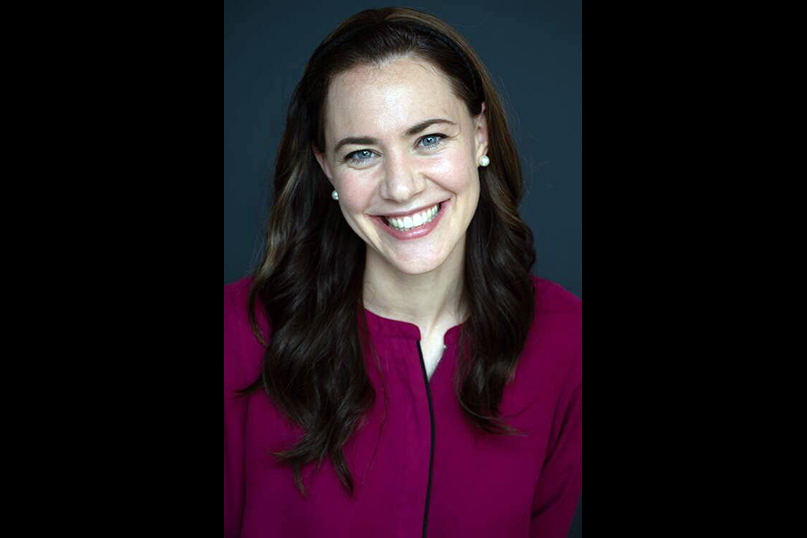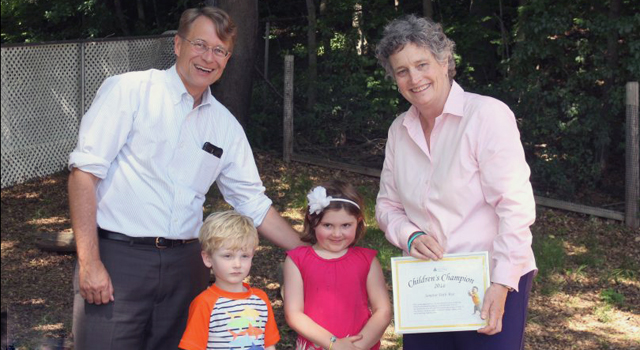
By Stacey Dresner
WEST HARTFORD, Connecticut – Ruthie Braffman Shulman has been named the first ever Community Scholar at Young Israel of West Hartford.
In this newly created position, Shulman will work to enhance the Orthodox synagogue’s educational programming and serve as Yoetzet Halacha, a Jewish law counselor providing counseling and Halakhic (Jewish legal) guidance in matters of Taharat HaMishpacha (family purity), intimacy, and women’s health.
“We are so delighted to welcome Ruthie Braffman Shulman to our professional team,” says Rabbi Tuvia Brander. “She combines many years of advanced learning with remarkable programmatic creativity and tremendous interpersonal skills.”
“Her role is dual but her official title is Community Scholar which means she will be seen as an educator and scholar – not just the yoetzet halachah – teaching men, women, young adults, seniors, children in all different venues and all different topics,” Rabbi Brander explained. “She is first and foremost a community scholar and someone who can engage all different demographics in Torah learning and Torah engagement.”
“We are thrilled to support this new initiative here at the Young Israel of West Hartford. Under Rabbi Tuvia Brander’s leadership, our community has become a vital and growing center of Jewish life,” said Jeremy Pava who, together with his wife Ann, is a member of Young Israel. The couple are also trustees of Micah Philanthropies, which provided the collaboration and financial support to make the new position possible.
“Rabbi Brander has absolutely created an environment that is looking for ways to enhance, not just womens’ leadership, but their meaningful experience in shul. He came to us with this idea and we loved it,” said Ann Pava. “We know Ruthie was an extraordinary leader in her previous shul, and so we were thrilled to support this.”
Shulman’s arrival at Young Israel reflects the move to expand women’s roles as spiritual leaders in Modern Orthodox synagogues. In 2017, after a survey of male and female leaders in the Orthodox community, the Orthodox Union (OU) convened a panel of rabbis who studied the issue regarding the role of women in their synagogues.
The study was done at least partly due to Rabbi Avi Weiss, the now retired leader of the Hebrew Institute of Riverdale, who, espousing what he dubbed an “Open Orthodox” approach to religious life, had founded Yeshivat Maharat. Weiss and his organization raised ire throughout the less liberal Orthodox world when they began ordaining women as clergy or “rabbas” in 2009.
The OU dismissed the idea of female rabbis in 2017 but in a statement agreed that “The failure to fully embrace the talents of women and encourage women to assume greater lay and professional roles is a tragic forfeiture of communal talent. We should focus on creating and institutionalizing roles for women that address the needs of Orthodox Jews today, by removing barriers that impede women from further contributing to our community, in halachically appropriate ways. We should fully utilize their talents and commitment, thereby fostering shmirat hamitzvot (observance of mitzvot), enhancing limmud Torah(Torah learning) and expanding the richness and vibrancy of Jewish life.”
“There is a value that we see strongly in being able to create opportunities for women with this sort of high-level Torah learning and Torah leadership position,” Rabbi Brander said. “The vision for this was really to provide an important service for our community both in the Yoetzet halahach – to provide women in our community the resource that that provides and the opportunity for women who very much value that mitzvah to have accessibility to women to consult with – and to provide a role model and Torah educator in the community that matches the values of our shul and of our community.”
An unintentional path
Shulman was a six-year-old living in Bala Cynwyd, Pennsylvania, when her Conservative parents decided to become Orthodox Jews.
The family, including two older siblings, joined the Lower Marion Synagogue where she says the vibrancy and the “tons of young children” appealed to her parents. Still, while she loved going to shul, she didn’t always have her sights set on becoming a Torah scholar in a synagogue.
“I thought I would go into Jewish education to teach in high school education. I’d worked in camps and I really love that age,” she explains.
Shulman received her B.A. from Stern College and her M.A. from Yeshiva University’s Graduate Program for Advanced Talmud Studies (GPATS).
It was during her two years working as a congregational intern at the Hebrew Institute of White Plains that she became passionate about Torah leadership and working in a synagogue.
“I got to work really closely with the rabbi who really mentored me. I worked with the congregants and I loved it,” she recalls. “I loved engaging with the community at all different levels – the adult education component and being somewhat accessible at the synagogue level. It opened up for me how much I loved being involved in synagogue life.”
She later had the opportunity to work at Pennsylvania University Hillel in its OU Jewish Learning Initiative on Campus.
When her husband got a job at a law firm in New York, they moved to Manhattan and she was introduced to the Manhattan Jewish Experience.
“They wanted to hire an Orthodox woman to be involved in the community and be involved in the Shabbat and holiday life.”
Three years later, Shulman became a Devorah Scholar, a program created by the Jewish Orthodox Feminist Alliance (JOFA) in partnership with the Pavas’ Micah Philanthropies. The program is devoted to increasing the number of spiritual leadership positions for Orthodox women in Orthodox shuls.
Shulman’s Devorah Scholar grant funded the two-thirds time position she held as director of education and engagement at United Synagogues of Houston. While there, she also began the two-year yoetzet program.
“The core of the yoetzet program is the Torah and the Jewish law side, but then we also had a lot of supplementary education,” she explains. “We had monthly medical seminars with an Ob Gyn. We also did pastoral counseling with psychologists and psychiatrists, [learned about] fertility. It’s a pretty intense program…The final study process is kind of like the Boards, you have to kind of review everything and know everything off the top of your head.”
For her it is important to share the “spiritual element to the mikvah that people don’t understand. It’s amazing what women go through every month. And here Judaism is actually trying to give it space and to honor it and say, ‘Look at this renewal and rejuvenation process that she goes through every month. And the mikvah is something that’s acknowledging that.”
Ann Pava concurs that the role of a Yoetzet Halachah is an important one. She referred to a survey that was done five years ago in the local Jewish and Orthodox community.
“We discovered when it came to issues like family purity or Nidah, I think only 15 percent of women were comfortable going to their rabbi,” Pava says. “The majority of people had their husbands do it, or they went online to get their questions answered. So this is really an area that women in particular are desperate for, I would say.”
Ann Pava is a longtime board member of JOFA. She and her husband Jeremy have been working to enhance women’s roles in Orthodox Judaism through their Micah Philanthropies, named after the prophet.
“We are driven by the most famous quote from the prophet Micah: ‘It has been told to you, mankind, what is good and what the Lord requires of you: only to do justice, tzedakah, to love kindness, chesed, and to walk humbly with your God,’” she says.
“We use that sort of as our basis for how we think about our philanthropy, whether its days schools, whether its JOFA or something in Israel. Living a life consistent with the prophet Micah, the covenantal ideal of being in a relationship and partnership with God to improve the world is really what we’re trying to do.”
But their goal, Ann says, is also “creating a meaningful, accessible, traditional Judaism, that synthesizes tradition with modernity, so we are focusing on those institutions, which is why we focus a lot on women in Orthodoxy. We think that traditional Judaism is a beautiful place to live and to function. And there are pieces of it that really need to be synthesized with modernity. For women not to have leadership roles – significant meaningful leadership roles – in Orthodox Judaism, prevents Orthodox Judaism from being relevant and prevents people from wanting to be there. It’s the same for LGBTQ issues; those are all areas that we are working on in an Orthodox traditional realm.”
For now, Shulman will be not relocating to the West Hartford area. She currently lives in her native Philadelphia with her husband and two young children. For this part-time position, she will combine in-person visits to Young Israel and remote engagements on Zoom and by telephone.
“I will be visiting a couple of times a year and those visits will hopefully be very full,” she says. “It’s going to be visiting the [religious] school and doing a lot of in-person, one-on-one meetings and programs, as well as a lot of virtual, especially in the post Covid Zoom world. This position of remote female scholar has existed before and I think it’s just opened up so many different opportunities now that the whole world does a lot of Zoom.
She was introduced to the community virtually late last month. Other Zoom programs with her include a Pre-Purim Shuir this past Monday evening, a coffee schmooz this Wednesday morning at 9:30 a.m. and a Virtual Fireside Chat “Steven Colbert, Tim O’Brien and Chazal: Does Jewish Law Always Reflect Reality? which will be held Monday, Feb 28 from 8- 9 p.m. Zoom Link: www.youngisraelwh.org/zoom
Already, the down-to-earth and affable Shulman is making strong connections with Young Israel members.
“I think what makes Ruthie a good fit at Young Israel or for any synagogue that she would go to is that she is very smart, very learned. She’s kind, warm, thoughtful, personable and articulate. She’s just a natural leader,” Ann Pava said. “She’s not a rabbi, but she certainly has everything that a spiritual leader needs to lead people. She’s inspirational.”








 Southern New England Jewish Ledger
Southern New England Jewish Ledger










